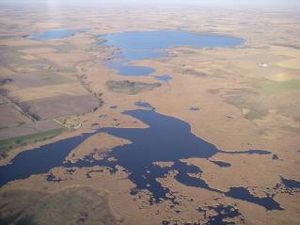Delta Waterfowl Foundation facts for kids
| Founded | 1911 |
|---|---|
| Type | Habitat Conservation and Hunting |
| Focus | Waterfowl habitat conservation |
| Location | |
|
Area served
|
North America |
|
Members
|
62,000 |
|
Key people
|
James Ford Bell, Aldo Leopold, Hans Albert Hochbaum |
|
Volunteers
|
670 |
The Delta Waterfowl Foundation is a group that helps protect waterfowl, like ducks and geese. They also work to make sure people can continue to hunt these birds. This non-profit organization works in both Canada and the United States. It is known as one of the best groups for protecting wildlife and hunting areas.
Contents
History of Delta Waterfowl
How It All Started
Back in the 1930s, a sportsman named James Ford Bell bought a large area of land. It was about 5,000 acres (20 square kilometers) in a place called Delta Marsh in Manitoba, Canada. Mr. Bell loved hunting waterfowl there. He also had a special place to raise and release birds.
A New Idea for Research
In 1938, Mr. Bell had an important idea. He talked to Aldo Leopold, who was a very important person in wildlife management. Bell wanted to create a special place at Delta Marsh to study waterfowl. Leopold agreed with this great idea.
Early Duck Studies
Aldo Leopold brought his student, Hans Albert Hochbaum, to the Delta Marsh. They started studying how ducks live and where they build their nests. Their work helped us understand a lot about duck ecology (how living things interact with their environment).

What Delta Waterfowl Does Today
Delta Waterfowl Foundation focuses on four main goals. These goals help them protect ducks and support hunting.
Duck Production
This means they work to help more ducks be born and survive. They use different methods to increase the number of ducks in the wild.
Habitat Conservation
Delta Waterfowl protects and improves the places where waterfowl live. This includes wetlands, marshes, and other important areas. Healthy habitats are key for ducks to thrive.
Research and Science
The foundation supports important studies about waterfowl. They help university students do research on duck populations and their environments. This science helps everyone understand how to best protect these birds.
HunterR3 Initiative
This program encourages people to get involved in duck hunting. It helps new hunters learn the ropes and makes sure hunting traditions continue. Hunters often play a big role in conservation efforts.
Delta Waterfowl also visits college campuses. They teach students about how hunters help with environmental science and wildlife protection.
See also
- Waterfowl hunting
- Ducks Unlimited
- Wildfowl and Wetlands Trust
 | Bayard Rustin |
 | Jeannette Carter |
 | Jeremiah A. Brown |

